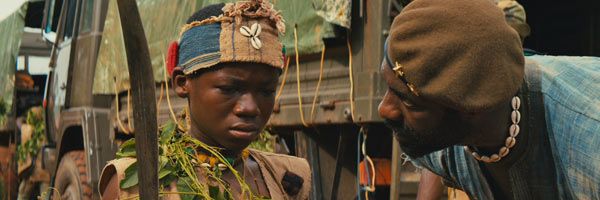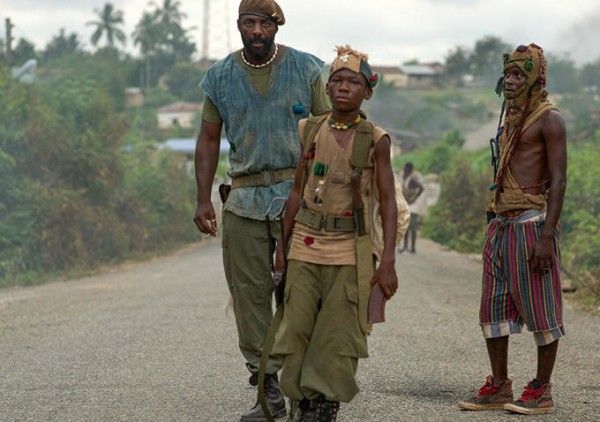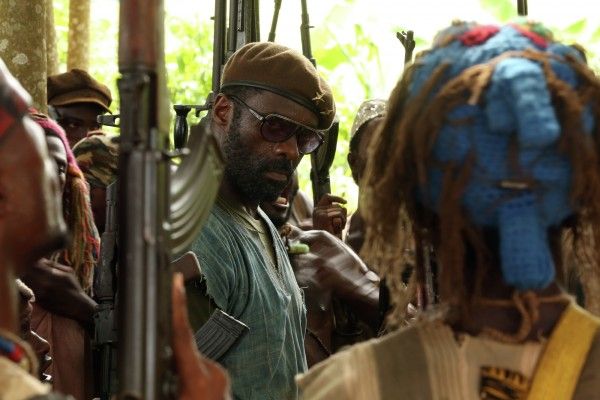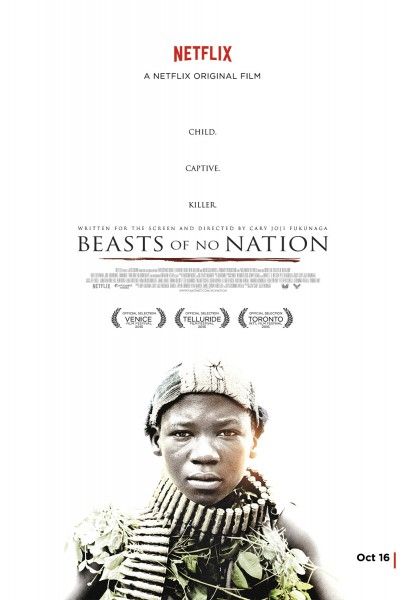[This is a re-post of my Beasts of No Nation review from the 2015 Toronto International Film Festival. The movie opens in limited release and is available to all Netflix users today. I highly encourage you to see it.]
A two hour-plus drama about West African child soldiers does not exactly sound like “a good time,” and indeed Cary Joji Fukunaga’s new film Beasts of No Nation is not an easy sell. But this gut-wrenching, beautiful yet brutal drama is an extraordinary piece of work and a bold film to act as Netflix’s first piece of original feature film content*. This movie is just as tough and emotionally devastating as you think it’s going to be, but Fukunaga presents the story in a way that refuses to devolve into platitudes or try and offer some sort of happy life raft for viewers to hang their hope on. Like reality, it is striking in its candor as Fukunaga tells a devastating tale of violence, emotional corruption, and indoctrination.
Based on the book of the same name by Uzodinma Iweala and scripted by Fukunaga, the film tells the story of Agu (Abraham Attah), a young villager whose life is destroyed when his family is caught in the middle of a war between army troops and rebels keen on toppling the corrupt regime. When he finds himself on his own, he is forced into the service of the charismatic Commandant (Idris Elba), whose charm and knack for oppression convinces Agu that by joining his rebel group, he is fighting to avenge his family.
What follows is, frankly, a haunting journey into hell. Fukunaga softens no edges of this vicious, unforgiving world and viewers are wholly immersed into Agu’s story. In the beginning of the film, Fukunaga wonderfully sets up Agu’s life before joining Commandant’s rebel group, as we see him playing with friends and using a broken television as an “imagination television,” acting out scenes through the broken screen. It not only reminds viewers that this is a child we’re dealing with, but also brings to mind the fact that the way the world normally becomes aware of these despicable acts (if they see them at all) is through television in the safety of our own homes. It’s one of so many striking images that Fukunaga conjures over the course of the film.
Fukunaga, also acting as his own cinematographer, shoots Beasts in a very naturalistic style that at times evokes Terrence Malick—though that comparison is also buoyed by Dan Romer’s dazzling, dreamlike score. The majority of the picture is presented elegantly but very matter-of-factly so as not to romanticize the lives of these young kids. It never feels like an “over there” story but instead immerses the viewer into this world. But Fukunaga does showcase his impeccable talent behind the camera a couple of times, with one positively stunning tracking shot in particular servicing the film’s biggest emotional gut punch.
The early violent scenes are shot with handheld in a very roughshod style that mimics Agu’s disorientation, but as he becomes more desensitized to the abhorrent acts that this rebel group enacts, Fukunaga opts to drain the color from certain sequences that evoke the numbness plaguing Agu. Indeed, while the film is no doubt an accurate account of a very real—and very troubling—type of warfare that is ongoing, it also extends thematically to the effects of violence on the human psyche and humanity as a whole. This is only amplified by the fact that the film’s protagonist is a 12-year-old-boy.
The pacing of Beasts of No Nation is deliberate, and at 133 minutes in length the film does start to sag in certain spots, but a magnetic performance by Elba and an absolutely incredible turn by newcomer Attah keep viewers engaged during some of the film’s rougher spots. Attah rises to the challenge of carrying this entire movie on his shoulders, imbuing Agu’s journey with the complexity and dynamism you’d expect from an actor twice or three times his age. He’s a revelation. And Elba, perhaps more subdued than one might be expecting, is nonetheless hypnotic as the dangerous father figure to this band of child soldiers.
But while the story of Beasts may be vast and seems to meander in areas where Agu’s life feels hopeless, that’s kind of the point. Fukunaga—one of the most exciting and gifted filmmakers working today—strives to capture the life of this child soldier with absolute honesty, and so the brief spots of aimlessness are meant to reflect Agu’s troubled, hopeless state of mind.
I’m honestly not sure how many people will actively seek this film out—we, as human beings, inherently like to be happy, not wallow in someone else’s misery for two hours. But I think as humans it’s vitally important to remind ourselves that the human experience is not singular. While difficult and devastating, a film as profoundly human as Beasts of No Nation enacts great empathy with a life—and maybe a world—that may seem entirely alien to some. But no matter how different we may be, we’re all human beings, and the effects of violence on both the oppressors and the oppressed are universal. We have the capacity to do great things as a human race, but we also have the capacity to do great evil.
Rating: A-
*Netflix didn’t produce Beasts of No Nation, but they acquired it for release and are its distributor.




